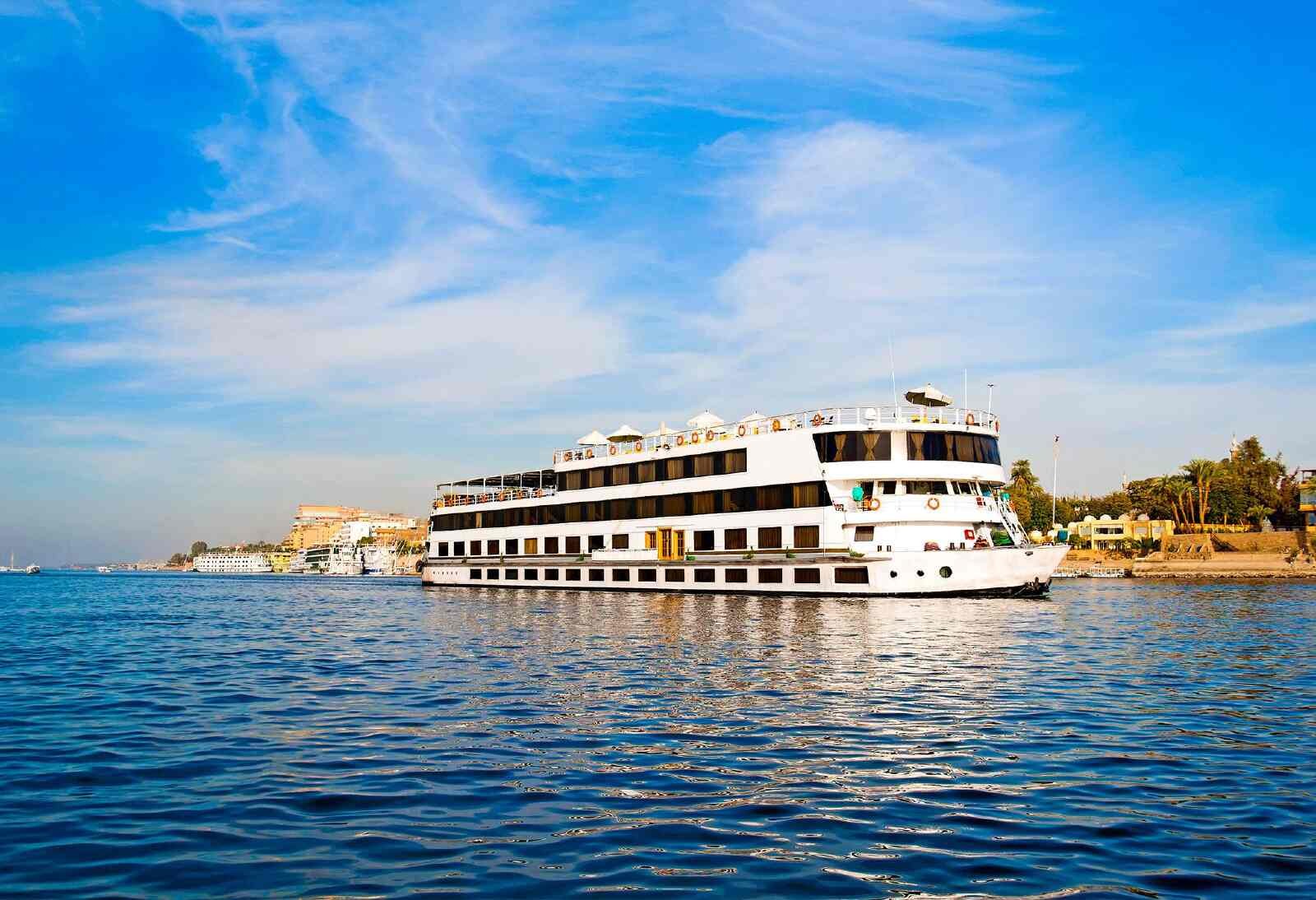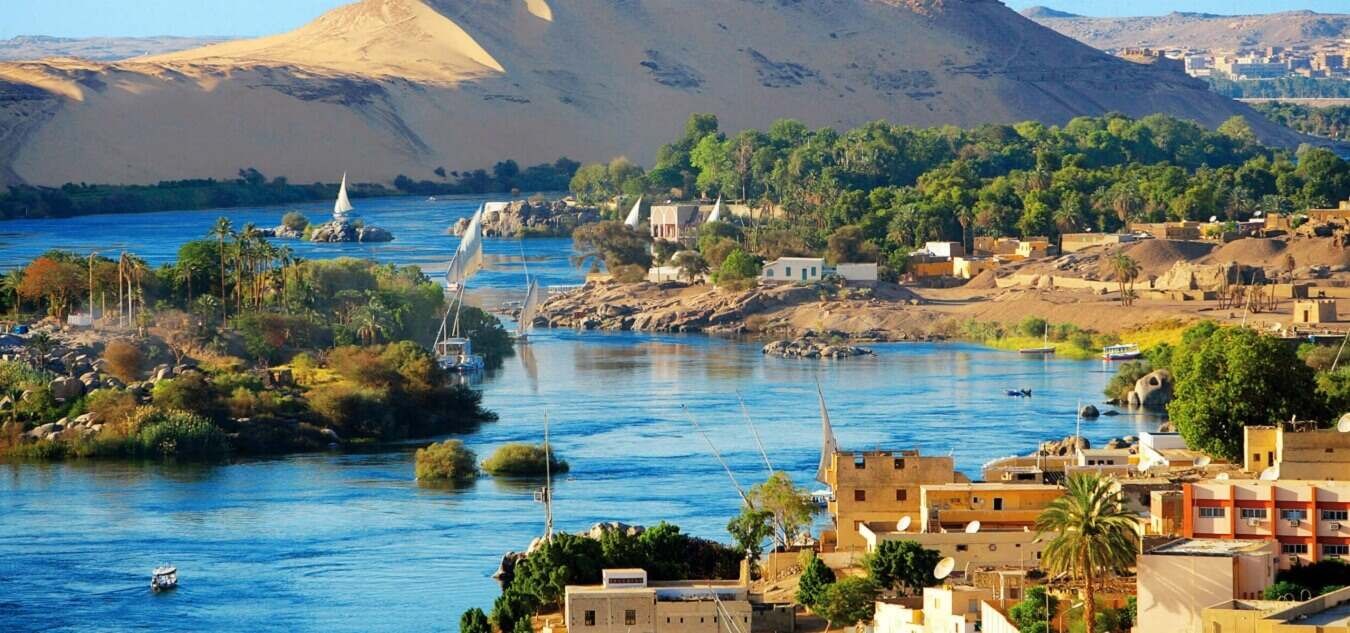Egypt cannot exist without the Nile. Ancient Egypt's development and survival were directly influenced by the Nile River. Water for agriculture, travel, and food were all made available to the ancient Egyptians by the River.
At 4,000 miles from its source in Burundi to the Mediterranean Sea, the Nile River is the longest river in the world. The White Nile and the Blue Nile are the two principal branches of the Nile River, which runs from south to north through Egypt. Most of the water that comes into Egypt enters through the White Nile, which is the primary branch of the river. One of the tributaries of the Nile that contributes to the yearly flooding of the Nile has its origins in Ethiopia.
The yearly flooding of the Nile, known as the immersion, was basic to the agrarian progress of old Egypt. The flooding would bring rich sediment and supplement rich soil to the land, considering the development of yields like wheat and grain. The flooding likewise gave the antiquated Egyptians water for water system, making it conceivable to develop crops in the generally bone-dry desert.
The Nile Waterway likewise assumed a vital part in transportation and exchange. The Nile was utilized as a significant transportation course for products and individuals, interfacing Upper and Lower Egypt. This considered the development of goods, thoughts, and individuals all through the nation, advancing monetary development and social trade.
The ancient Egyptians obtained their sustenance from the River. The ancient Egyptians' diet included a lot of fish since it was plentiful in the Nile. A number of aquatic plants that were utilised as food and medicinal were also found in the Nile.
The ancient Egyptians also found inspiration from the Nile River. Several gods and goddesses were connected to the Nile and its yearly flooding because it was revered as a source of fertility and life. The ancient Egyptians drew their artistic, literary, and architectural inspiration from the Nile.

Luxor and Aswan are two of the most well known objections for vacationers visiting Egypt, and a Nile cruise is the ideal method for investigating these old urban communities and their environmental elements. The Nile Waterway is the longest stream on the planet, extending more than 4,000 miles from its source in Burundi to the Mediterranean Sea. In Egypt, the Nile Stream streams from south to north and is partitioned into two fundamental branches: the White Nile and the Blue Nile. The White Nile is the principal part of the stream and is answerable for the majority of the water that streams into Egypt.
Traditional Nile cruisers, Lake Nasser cruisers, and Dahabiya cruises are a some of the alternatives for Nile cruises. Visitors may explore the Nile in different ways while on each sort of trip, which each offers a distinctive experience.
Classic Nile cruisers are large ships with plenty of room for guests. These cruise ships often have a restaurant, a pool, and many decks. They normally go between Luxor and Aswan, stopping at a number of well-known tourist attractions along the way, including the temples of Karnak and Abu Simbel.
Cruises on the artificial Lake Nasser, which was formed following the construction of the Aswan High Dam, are a more upscale choice and are available. With fewer guests on board, these cruises often provide a more personalised and laid-back experience. Also, they provide visitors the chance to examine the Abu Simbel and Philae temples and other antiquities that were moved near the lake to escape inundation.
Dahabiya cruises are a more conventional and sumptuous option that offer a unique and individualised experience. Often, dahabiya excursions consist of smaller boats that can accommodate fewer persons. Most of the time, they move more slowly and offer more individualised care. Moreover, Dahabiya cruises usually concentrate on travelling to the less-traveled areas of the Nile.

A Nile cruise is a fantastic opportunity to discover Luxor and Aswan's historic towns and the area around them, regardless of whatever option you select. The Nile River served as an essential source of water, food, transportation, and inspiration for the ancient Egyptians, and it still serves as a significant resource for Egyptians today. An opportunity to explore the Nile's beauty, history, and the prehistoric civilisation that once flourished along its banks is offered by a Nile cruise. Moreover, to discover the Nile's natural splendour, including its palm trees, birds, and other wildlife that call the Nile's banks home. Check out our amazing Egypt tours and Egypt luxury tours.
Find out our latest news, promotions, and professional tips. Know before you book your next Egypt tours
Egypt has many historical sites that you can visit and enjoy. Each tour is different and unique. If you go on a Nile cruise, you can visit Abu Simbel, Aswan, and Luxor in the South and enjoy the temples, tombs, and the treasures of the Nile. In the North, enjoy the Pyramids of Giza, The Egyptian Museum, Sakkara. Mosques, churches in Cairo, and many landmarks located in the city of Alexandria. On the East, Enjoy a beach tour for diving, snorkeling, and swimming in the Red sea. Every city has its charm, history, and flavor where you can do many tours and activities.
Your Egypt Tours is one of Egypt’s leading and most trusted travel agencies, known for its personalized service and expert care. As a top-rated company for Egypt tour packages, we ensure every Egypt trip is safe, seamless, and unforgettable, offering competitive prices, excellent customer service, and the highest standards of quality. With us, you’re always in good hands.
The average cost of a one-week trip in Egypt is around 1600 USD, including visits to tombs, temples, and a Nile cruise. Prices vary depending on the Egypt tours and the level of luxury you choose.
It’s not recommended to drink tap water in Egypt, as it’s highly chlorinated and may cause stomach issues for travelers. During your Egypt tours, it’s best to drink bottled water and use tap water only for washing or brushing your teeth.
The best time to enjoy Egypt tours is from September to March, when the weather is mild and pleasant. During these months, temperatures are ideal for sightseeing and Nile cruises. Summer (May to September) can be very hot, but it’s also a good time for budget travelers.
Egypt is generally hot and sunny most of the year, with winter falling between November and January, and summer peaking from June to August. Winters are mild, while summers can get very hot, especially in Luxor and Aswan. The pleasant weather from September to March makes it the best time to enjoy Egypt tours and explore the country's top attractions comfortably.
Yes, Egypt is a very safe country to visit, with a low crime rate and strong security measures in all tourist areas. The government ensures that accommodations and attractions remain clean and well-monitored for travelers’ comfort. When you book Egypt tours, you’ll find professional guides and organized arrangements that make your trip worry-free and enjoyable.
Egypt offers adventures for every traveler. Explore the majestic Pyramids of Giza, sail along the Nile on a Luxury cruise between Luxor and Aswan, and discover ancient temples and tombs that tell the story of the Pharaohs. Dive or snorkel in the Red Sea at Hurghada and Sharm El Sheikh, or enjoy a relaxing beach escape. Book one of our Egypt tours to experience the perfect mix of history, culture in one unforgettable journey.
Yes, you can, summer is still a great time to explore Egypt! While temperatures can rise to around 45°C, seaside resorts like Hurghada, Sharm El Sheikh, and Marsa Alam offer refreshing escapes with diving and snorkeling opportunities. Sightseeing in the early morning or evening helps you avoid the midday heat. Summer also brings great deals on hotels and services, making it ideal for travelers on a budget. Whether you’re seeking relaxation or adventure, Egypt tours during summer can still be an enjoyable and memorable experience.
Egypt has a modest dress code, especially for women, since it’s a Muslim country. Light, comfortable clothing is fine, but avoid short shorts or skirts. When visiting religious sites, cover your shoulders and knees. During Egypt tours, you can dress casually and comfortably; formal wear is optional unless you want to make your Nile cruise dinner extra special.
You can easily obtain a visa upon arrival at Cairo Airport, the process is simple for USA, UK, Canadian, Australian, and European citizens. The visa costs $25 USD and can be purchased at the visa office before immigration. You can also apply for an E-Visa through the official portal: www.visa2egypt.gov.eg. During your Egypt tours, our team can assist you with all visa-related inquiries to make your arrival smooth and stress-free.
Your Egypt Tours travel agency recommends two weeks so that you can enjoy the temples and tombs of Luxor and Aswan, explore the sights of Cairo, and relax in the Red Sea islands and nature reserves.
The best Egypt Nile River cruise depends on your preferences, budget, and how many nights you wish to spend on board. For a truly unforgettable experience, we recommend a 5-star luxury Nile cruise that offers exceptional comfort and service. If you prefer a more private and intimate journey, choose a Dahabiya Nile cruise, ideal for small groups of around 15 people. For adventurous travelers, the traditional Felucca boats provide a simple and authentic way to sail the Nile during your Egypt tours, though they offer fewer amenities.
The best time to visit Egypt is generally from October to April where it is suitable for outdoor activities and sightseeing.
Egypt travel usually have guided tours to archaeological sites, museums, and historical landmarks. Also have optional activities may include hot air balloon rides over Luxor, snorkeling in the Red Sea, or desert safaris.
